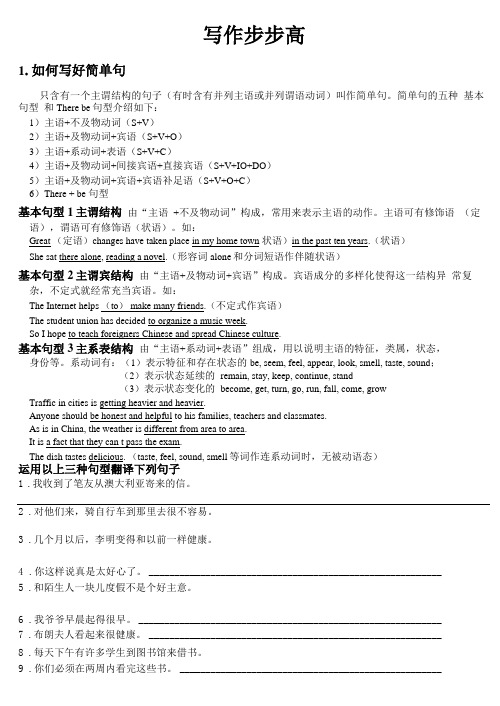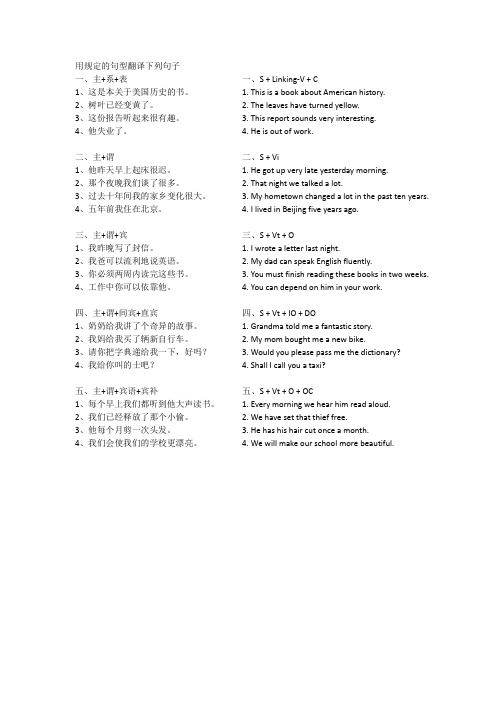5个基本句型翻译答案
- 格式:doc
- 大小:46.50 KB
- 文档页数:6

句子基本结构和成分1句子基本句型英语基本句型分为五种:主谓SV、主谓宾SVO、主系表SLP、主谓双宾SVOO、主谓宾宾补SVOC。
五种句型概述:句型主语谓语/系动词宾语/表语备注主谓SV Everybody laughed.主系表SLP She is a teacher.主谓宾SVO I love you.主谓双宾SVOO David asked me a question.其中‘me’和‘a question’两个宾语。
主谓宾宾补SVOC They painted the wall white.其中,white 为宾补修饰宾语the wall。
1.1主谓句型(Subject Predicate Verb-SV)1.1.1解析主谓句型与主谓宾句型最大的区别在于谓语动词的及物与不及物。
英语把及物动词叫做 transitive verb,不及物动词叫做intransitive verb.”transitive”在英语中是传递的意思,所以,如果动词表示的动作可以直接传递到某个事物,则称为及物动词,反之称为不及物动词。
及物动词与不及物动词又可以称为外动作词和内动作词。
外动作词是动作涉及或(达到)别的事物的动词,内动作词是动作凝于或止于主体本身的动词。
1.1.2基本结构:主语+不及物动词1.1.3主语可以作主语的成分有名词(如boy),主格代词(如you),数词,动词不定式,动名词等。
主语一般在句首。
注意名词单数形式常和冠词不分家。
1.1.4谓语谓语由动词构成,是英语时态、语态变化的主角,一般在主语之后,后接宾语。
但谓语可以是不及物动词(vi.),没有宾语,形成主谓结构。
1.1.5例句分析:(1)The sun is rising. 太阳正在升起。
(2)Tim is sleeping. 蒂姆正在睡觉。
(3)The train is arriving.火车要到站了。
(4)We waited and waited. 我们等了又等。


写作步步高1.如何写好简单句只含有一个主谓结构的句子(有时含有并列主语或并列谓语动词)叫作简单句。
简单句的五种基本句型和There be句型介绍如下:1)主语+不及物动词(S+V)2)主语+及物动词+宾语(S+V+O)3)主语+系动词+表语(S+V+C)4)主语+及物动词+间接宾语+直接宾语(S+V+IO+DO)5)主语+及物动词+宾语+宾语补足语(S+V+O+C)6)There + be 句型基本句型1主谓结构由“主语+不及物动词”构成,常用来表示主语的动作。
主语可有修饰语(定语),谓语可有修饰语(状语)。
如:Great (定语)changes have taken place in my home town 状语)in the past ten years.(状语)She sat there alone, reading a novel.(形容词alone和分词短语作伴随状语)基本句型2主谓宾结构由“主语+及物动词+宾语”构成。
宾语成分的多样化使得这一结构异常复杂,不定式就经常充当宾语。
如:The Internet helps (to) make many friends.(不定式作宾语)The student union has decided to organize a music week.So I hope to teach foreigners Chinese and spread Chinese culture.基本句型3主系表结构由“主语+系动词+表语”组成,用以说明主语的特征,类属,状态,身份等。
系动词有:(1)表示特征和存在状态的be, seem, feel, appear, look, smell, taste, sound;(2)表示状态延续的remain, stay, keep, continue, stand(3)表示状态变化的become, get, turn, go, run, fall, come, grow Traffic in cities is getting heavier and heavier.Anyone should be honest and helpful to his families, teachers and classmates.As is in China, the weather is different from area to area.It is a fact that they can t pass the exam.The dish tastes delicious. (taste, feel, sound, smell等词作连系动词时,无被动语态)运用以上三种句型翻译下列句子1.我收到了笔友从澳大利亚寄来的信。

用规定的句型翻译下列句子一、主+系+表1、这是本关于美国历史的书。
2、树叶已经变黄了。
3、这份报告听起来很有趣。
4、他失业了。
二、主+谓1、他昨天早上起床很迟。
2、那个夜晚我们谈了很多。
3、过去十年间我的家乡变化很大。
4、五年前我住在北京。
三、主+谓+宾1、我昨晚写了封信。
2、我爸可以流利地说英语。
3、你必须两周内读完这些书。
4、工作中你可以依靠他。
四、主+谓+间宾+直宾1、奶奶给我讲了个奇异的故事。
2、我妈给我买了辆新自行车。
3、请你把字典递给我一下,好吗?4、我给你叫的士吧?五、主+谓+宾语+宾补1、每个早上我们都听到他大声读书。
2、我们已经释放了那个小偷。
3、他每个月剪一次头发。
4、我们会使我们的学校更漂亮。
一、S + Linking-V + C1. This is a book about American history.2. The leaves have turned yellow.3. This report sounds very interesting.4. He is out of work.二、S + Vi1. He got up very late yesterday morning.2. That night we talked a lot.3. My hometown changed a lot in the past ten years.4. I lived in Beijing five years ago.三、S + Vt + O1. I wrote a letter last night.2. My dad can speak English fluently.3. You must finish reading these books in two weeks.4. You can depend on him in your work.四、S + Vt + IO + DO1. Grandma told me a fantastic story.2. My mom bought me a new bike.3. Would you please pass me the dictionary?4. Shall I call you a taxi?五、S + Vt + O + OC1. Every morning we hear him read aloud.2. We have set that thief free.3. He has his hair cut once a month.4. We will make our school more beautiful.。

基本句型汉译英练习主谓宾结构(一)说明:此结构是由主语+谓语+宾语够成。
其中的谓语动词须是及物的动词或及物的动词词组。
宾语须是名词或相当于名词的成分。
翻译练习:昨晚我写了一封信。
今天下午我想同你谈谈。
这本书他读过多次了。
他们成功地完成了计划。
你们必须在两周内看完这些书。
那位先生能流利地说三种语言。
我收到了笔友从澳大利亚寄来的信。
Jim 还不会自己穿衣服。
我们大家都相信Jack 是一个诚实男孩。
他不知道说什麽好。
他每天早晨洗冷水澡。
我开窗户你在意吗?参考答案:1.I wrote a letter last night.2.I want to talk with you this afternoon.3.He has read this book many times.4.They have carried out the plan successfully.5.You must finish reading these books in two weeks.6.That gentlemen can speak three languages fluently.7.I received a letter from my pen friend in Australia.8.Jim cannot dress himself.9.All of us believe that Jack is an honest boy.10.He did not know what to say.11.He takes a cold bath every morning.12.Do you mind my opening the window?主谓宾结构(二)说明:此结构中的谓语动词常常是动词词组,分两种情况:1.及物动词+副词,2.不及物动词+介词。
1.含有away, out, forward, up 等副词的动词词组是可拆分的。

英语的基本句型主要有五种,它们是:1、主语——动词——表语2、主语——动词3、主语——动词——宾语4、主语——动词——宾语——宾语5、主语——动词——宾语——补语掌握好这些基本句型,就可以为灵活运用语言打下良好的基础。
下面分别讲解这五种句型。
一、主语——动词——表语在这一句型中,动词是系动词,划线部分为表语。
1.Mr.Brown is an engineer.<名词做表语>2.Gradualy he became silent.<形容词做表语>3.She remained standing for a hour.<现在分词做表语>4.The question remained unsolved.<过去分词做表语>5.The machine is out of order.<介词短语做表语>6.The television was on.<副词做表语>7.His plan is to keep the affair secret.<动词不定式做表语>8.My job is repairing cars.<动名词做表语>9.The question is what you want to do.<从句做表语,即:表语从句>注意:在下面的句子中,形容词做表语,在表语的后面常常接不定式结构。
I'm happy to meet you.They are willing to help.We are determined to follow his example.二、主语——动词在这一句型中,动词为不与物动词与不与物的动词词组。
在有的句子中,不与物动词可以有状语修饰。
1.The sun is rising.2.I'll try.3.Did you sleep well?<well做状语,修饰不与物动词sleep>4.The engine broke down.注意:在此句型中,有少数不与物动词表达被动含义,表达主语本身所具有的特性,不用被动语态。
基本句型 主谓结构说明: 本结构是由主语加不及物的谓语动词构成 , 常用来表示主语的动作。
如, The sun rises. 主语可有修饰语 --- 定语,如, The red sun rises. 谓语可有修饰语 --- 状语,如, The red sun rises inthe east 翻译练习: 1. 你应当努力学习。
3. 那天早上我们谈了很多。
5.在过去的十年里,我的家乡已经发生了巨大的变化。
7.1919 年,在北京爆发了“五 .四”运动。
9.这个盒子重五公斤。
11. 爱丽丝很会游泳。
13. 秋天有些鸟飞到南方去。
15. 每天下午有许多学生到图书馆来借书。
17. 月亮升起了。
19.我们大家都呼吸、吃和喝。
21.他所讲的没有什么关系。
23.这支笔书写流利。
基本句型 主系表结构 说明:本结构是由 主语+系动词 +表语组成,主要用以 2.她昨天回家很晚。
4.会议将持续两个小时。
6.这种事情全世界各地每天都在发生。
8.每天八时开始上课。
10.五年前我住在北京。
12.约翰的父亲昨晚去世了。
14.我的爷爷早晨起得很早。
16.太阳在照耀着。
18.宇宙长存。
20.管它呢?(1)表示特征和存在状态的 (2)表示状态延续的 (3)表示状态变化的 翻译练习:1. 我的兄弟都是大学生。
3. 布朗夫人看起来很健康。
5. 孩子们,请保持安静。
7.她的工作是在幼儿园里照看儿童。
9.树叶已经变黄了。
11.这是本英汉辞典。
13.他堕入了情网。
15.他长得又高又壮be, seem, feel, appear, look, smell, taste, sound.remain, stay, keep, continue, stand. become, get, turn, go, run, fall, come, grow.2. 冬季白天短,夜晚长。
4.十五岁他就成为有名的钢琴家了6. 这本书是有关美国历史的书。
英语简单句的五种基本句型简单句:只包含一个主语(或并列主语)和一个谓语(或并列谓语)的句子,称作简单句。
简单句的基本句型:简单句有以下5种基本句型。
1.主语+ 不与物动词 例:It is raining heavily. My tooth aches. 翻译:1. 他昨天锻炼了。
2. 这只鸭子正在游泳。
3. 这个女孩儿跳舞好。
4. 风筝在天上飞。
2.主语 + 与物动词 + 宾语 例:They enjoy the play. I met John in the street yesterday. 翻译:1. 他喜欢篮球比赛。
2. 他每天打电脑游戏。
3. 她正在弹吉他。
4. 他们经常放风筝。
3.主语 + 系动词 + 表语例:He is out. Jenny is fine. It looks like rain soon.翻译:1. 他是美国人。
2. 2. 苹果尝起来味道很好。
3. 树变绿了。
4. 你的主意听起来不错。
4. 主语 + 与物动词 + 双宾语例:He bought her a watch. The sun gives us light. 翻译:1. 他给我讲了个故事。
2. 他们送给我一个礼物。
3. 我爸爸给我买了一辆新自行车。
4. 我同学借给我了一本字典。
注意:双宾语一个指人(即间接宾语),另一个指物(即直接宾语)。
一般间接宾语位于直接宾语的前面,有时它们也可交换位置,这是需要在间接宾语的前面加上介词to 或for 。
常见的双宾语结构:bring sb. sth (bring sth to sb). give sb. sth (give sth to sb.)hand sb. sth (hand sth to sb.) leave sb. sth (leave sth.to sb) lend sb. sth (lend sth to sb) pass sb sth (pass sth to sb)return sb. sth (return sth to sb) send sb sth (send sth to sb)show sb sth (show sth. to sb.)tell sb sth (tell sth to sb ) write sb sth (write sth to sb ) buy sb sth (buy sth for sb ) do sb sth (do sth for sb ) get sb sth (get sth for sb ) make sb. sth (make sth for sb) pay sb. sth (pay sth for sb)sing sb sth (sing sth for sb )5.主语 + 与物动词 + 宾语 + 补足语例:He told me to clean my room. I saw her dancing. 翻译:1. 我们老师要求我们每天读英语。
高中英语句型总结大全及答案一、基本句型1.Subject + Verb–Example: He plays basketball.2.Subject + Verb + Object–Example: She eats an apple.二、肯定句型1.Subject + Be (am/is/are) + Adjective/Noun–Example: She is beautiful.2.Subject + Verb + Complement–Example: He looks happy.三、否定句型1.Subject + Do/Does/Did + Not + Verb–Example: They do not like ice cream.2.Subject + Be (am/is/are) + Not + Adjective/Noun–Example: It is not easy.四、疑问句型1.Be (am/is/are) + Subject + ?–Example: Are you ready?2.Do/Does/Did + Subject + Verb + ?–Example: Did she finish her homework?五、特殊句型1.There + Be + Subject + (Adjective/Noun)–Example: There is a cat on the table.2.It + Be (am/is/are) + Adjective/Noun + (for + Subject) + to + Verb–Example: It is important for us to study hard.六、答案示例1.肯定回答:•Yes, I am.•Yes, she did.2.否定回答:–No, they are not.–No, it is not mine.结语以上是高中英语句型总结大全及答案的内容,希望对您有所帮助并提升英语表达能力。
英语五大基本句型英语中的五种基本句型结构一、句型1:Subject (主语)+Verb (谓语)这种句型中的动词大多是不及物动词,所谓不及物动词,就是这种动词后不可以直接接宾语。
常见的动词如:work, sing, swim, fish, jump, arrive, come, die, disappear, cry, happen等。
如:1) Li Ming works very hard.李明研究很努力。
2) The accident happened yesterday afternoon.事故是昨天下午发生的。
3)Spring is coming.4) We have lived in the city for ten years.二、句型2:Subject (主语)+Link. V(系动词)+Predicate(表语)这种句型主要用来表示主语的特点、身份等。
其系动词一般可分为下列两类:(1)透露表现状态。
这样的词有:be, look, seem, smell, taste, sound, keep等。
如:1) This kind of food tastes delicious.这种食物吃起来很适口。
2) He looked worried just now.刚才他看上去有些焦虑。
(2)透露表现变革。
这类系动词有:become, turn, get, grow, go等。
如:1) Spring comes. It is getting warmer and warmer.春天到了,气候变得越来越和煦。
2) The tree has grown much taller than before.这棵树比从前长得高多了。
三、句型3:Subject(主语)+Verb (谓语)+Object (宾语)这种句型中的动词普通为及物动词,所谓及物动词,就是这种动词后可以直接接宾语,其宾语平日由名词、代词、动词不定式、动名词或从句等来充任。
主谓结构参考答案:1.You should study hard.2.She went home very late yesterday evening.3.That morning we talked a great deal.4.The meeting will last two hours.5.Great changes have taken place in my home town in the past ten years.6.Things of that sort are happening all over the world every day.7.The May Fourth Movement broke out in Beijing in 1919.8.Classes begin at eight every day.9.This box weighs five kilos.10.I lived in Beijing five years ago.11.Alice swims very well.12.John’s father di ed last night.13.In autumn, some birds fly to the south.14.My grandfather gets up early in the morning.15.Every afternoon a lot of students come to the library to borrow books.1. The sun │was shining. 太阳在照耀着。
2. The moon │rose. 月亮升起了。
3. The universe │remains. 宇宙长存。
4. We all │breathe, eat, and drink. 我们大家都呼吸、吃和喝。
5. Who │cares? 管它呢?6. What he said │does not matter. 他所讲的没有什么关系。
7. They │talked for half an hour. 他们谈了半个小时。
8. The pen │writes smoothly 这支笔书写流利。
主语+系动词+表语参考答案:1.My brothers are all college students.2.In winter, the days are short and the nights are long.3.Mrs Brown looks very healthy.4.At the age of fifteen he became a famous pianist.5.Children, keep quiet please.6.This book is about the history of the United States.7.Her job is to look after the children in the nursery.8.He is out of work.9.The leaves have turned yellow.10.The report sounds interesting.1. This │is │an English-Chinese dictionary. 这是本英汉辞典。
2. The dinner │smells │good. 午餐的气味很好。
3. He │fell │in love. 他堕入了情网。
4. Everything │looks │different. 一切看来都不同了。
5. He │is growing │tall and strong. 他长得又高又壮6. The trouble│is │that they are short of money. 麻烦的是他们缺少钱。
7. Our well │has gone │dry. 我们井干枯了。
8. His face │turned │red. 他的脸红了。
主谓宾结构(一)1.I wrote a letter last night.2.I want to talk with you this afternoon.3.He has read this book many times.4.They have carried out the plan successfully.5.You must finish reading these books in two weeks.6.That gentlemen can speak three languages fluently.7.I received a letter from my pen friend in Australia.8.Jim cannot dress himself.9.All of us believe that Jack is an honest boy.10.He did not know what to say.11.He takes a cold bath every morning.12.Do you mind my opening the window?6. He │said │"Good morning." 他说:"早上好!"7. I │want │to have a cup of tea. 我想喝杯茶。
8. He │admits │that he was mistaken. 他承认犯了错误。
主谓宾结构(二)参考答案:1.I don’t believe in(介) that man.2.He pointed out(副)the mistakes in my composition.3.On Christmas Day, we will call on(介)our foreign teachers.4.You must hand in(副)your exercise-books after class.5.We cannot work out(副)the problem in five minutes.6.They spoke highly of the deeds of the hero.7.The nurse will take good care of your father.8.You can depend on(介)him in your work.9.Boiling water gives off(副)steam.10.After writing a composition,we must go over(介)it.11.Take off your coat and put it on(副)before you leave.12.People will find her out(副).13.We must send for(介)a doctor双宾语结构参考答案:1.Mr Johnson taught us German last year.2.Grandma told me an interesting story last night.3.Mary handed the wallet to the schoolmaster.4.Would you please pass me the dictionary?5.He showed the ticket to the conductor.6.This term I have written three letters to my parents.7.My father has bought me a new bike.8.Robinson Crusoe made himself a boat.9.Will you please get me a new copy?10.Shall I call you a taxi?11.The new machine will save you a lot of labour1. She │ordered │herself │a new dress. 她给自己定了一套新衣裳。
2. She │cooked │her husband │a delicious meal. 她给丈夫煮了一顿美餐。
3. He │brought │you │a dictionary. 他给你带来了一本字典。
4. He │denies │her │nothing. 他对她什么都不拒绝。
5. I │showed │him │my pictures. 我给他看我的照片6. I │gave │my car │a wash. 我洗了我的汽车。
7. I │told │him │that the bus was late. 我告诉他汽车晚点了。
8. He │showed │me │how to run the machine. 他教我开机器。
主语+及物的谓语动词+宾语+宾语补足语1.We call her Alice.2.His parents named him John.3.All of us considered him honest.4.They pushed the door open.5.They have set the thief free.6.We will make our school more beautiful.7.He asked us to join in the game.8.I want you to tell me the truth.9.The guards ordered us to leave at once.10.Tomorrow I’ll have someone repair the machine.11.Every morning we hear him read English aloud.12.The pain made him cry out.13.We won’t let her go out at night.14.He has his hair cut once a month.15.I’ll get my recorder m ended.16.The terrible sound made the children frightened.17.She is listening to someone telling stories.18.The boys were watching the soldiers drilling.19.I have never seen the word used that way before.20.He felt it very difficult to talk with you.21.I think it more comfortable to go there by ship.22.I consider it possible to work out the problem in another way.23.The school made it a rule that the students should stand up when class begins.24.I thought it no use talking with that man1. They │appointed │him │manager. 他们任命他当经理。